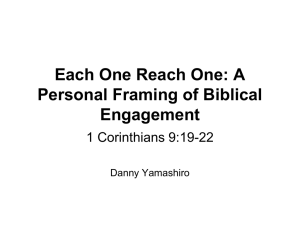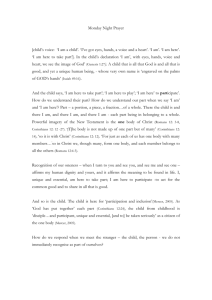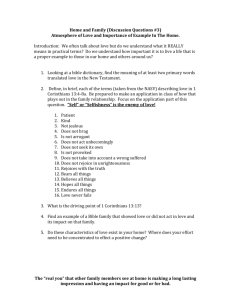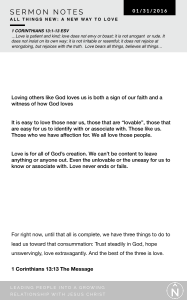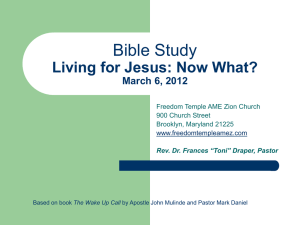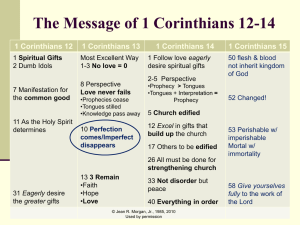The Daily Bible in Chronological Order pages 1553 – 1559
advertisement
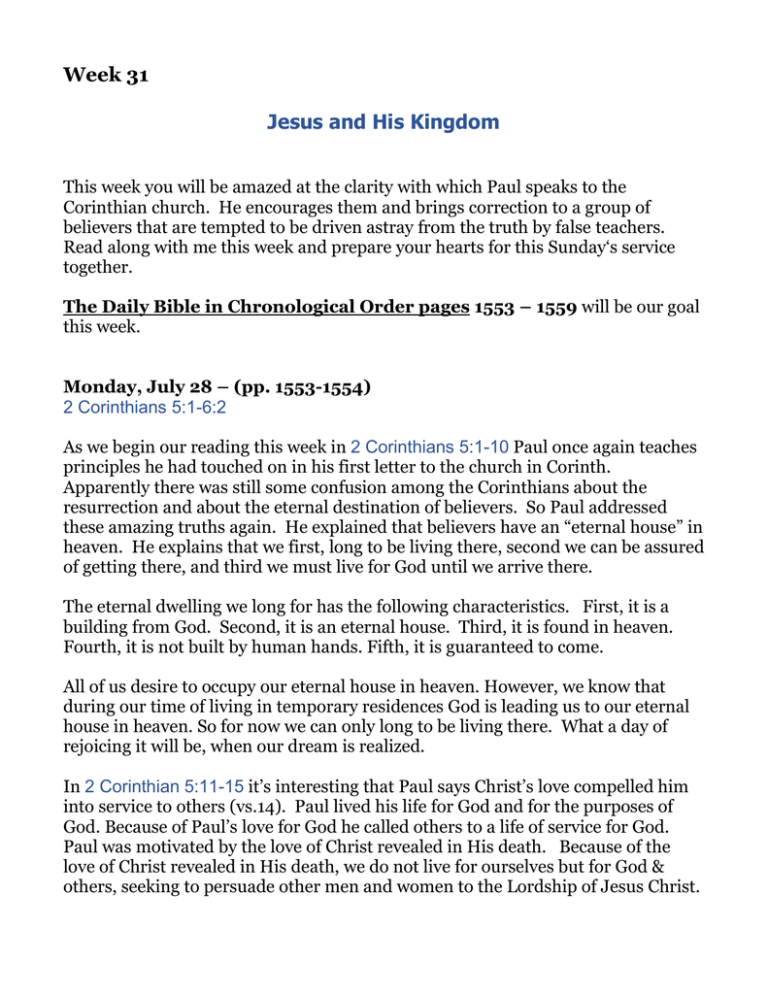
Week 31 Jesus and His Kingdom This week you will be amazed at the clarity with which Paul speaks to the Corinthian church. He encourages them and brings correction to a group of believers that are tempted to be driven astray from the truth by false teachers. Read along with me this week and prepare your hearts for this Sunday‘s service together. The Daily Bible in Chronological Order pages 1553 – 1559 will be our goal this week. Monday, July 28 – (pp. 1553-1554) 2 Corinthians 5:1-6:2 As we begin our reading this week in 2 Corinthians 5:1-10 Paul once again teaches principles he had touched on in his first letter to the church in Corinth. Apparently there was still some confusion among the Corinthians about the resurrection and about the eternal destination of believers. So Paul addressed these amazing truths again. He explained that believers have an “eternal house” in heaven. He explains that we first, long to be living there, second we can be assured of getting there, and third we must live for God until we arrive there. The eternal dwelling we long for has the following characteristics. First, it is a building from God. Second, it is an eternal house. Third, it is found in heaven. Fourth, it is not built by human hands. Fifth, it is guaranteed to come. All of us desire to occupy our eternal house in heaven. However, we know that during our time of living in temporary residences God is leading us to our eternal house in heaven. So for now we can only long to be living there. What a day of rejoicing it will be, when our dream is realized. In 2 Corinthian 5:11-15 it’s interesting that Paul says Christ’s love compelled him into service to others (vs.14). Paul lived his life for God and for the purposes of God. Because of Paul’s love for God he called others to a life of service for God. Paul was motivated by the love of Christ revealed in His death. Because of the love of Christ revealed in His death, we do not live for ourselves but for God & others, seeking to persuade other men and women to the Lordship of Jesus Christ. Tuesday, July 29 – (pp. 1554-1555) 2 Corinthians 6:3-7:1 As we continue to read today we get the picture that Corinth was a challenging place for Paul to minister. He faced constant opposition by some very persuasive people within this church. False accusations were constantly being heaved toward him. Although his ministry was difficult, Paul did not surrender to the pressure. He carried out the work he had been called to do. For most of us the hardship that Paul speaks of is alien to us. Living in the United States we are free to serve God and worship Him. We ought to thank God that we have been spared such difficulty. We may never face what Paul did. On the other hand Paul and others accomplished so much while under persecution. We must ask the question, what are we accomplishing for the Lord under little or no persecution? What does it mean to be “yoked together” with unbelievers (2 Corinthians 6:14)? Being bound (being "unequally yoked”) has to do with joining an unbeliever in sin. It means to be in partnership, fellowship, harmony, being in agreement with an unbeliever in sinful acts or deeds. It means involving ourselves in a relationship where sin will, or probably will occur. What kind of human relationships do we apply this teaching to as children of God? All of them! We must join in no partnership that will involve us in evil. We are to bring honor to God by having relationships that are healthy. Paul also warned the Ephesian church "And do not participate in the unfruitful deeds of darkness, but instead even expose them." (Ephesians 5:11). Solomon also gave his son good advice in this area. “He who walks with the wise grows wise, but a companion of fools suffers harm.” (Proverbs 13:20) In Paul’s first letter to the Corinthians he explained to them “Do not be misled: ‘Bad company corrupts good character.’ ” (1 Corinthians 15:33) Wednesday, July 30 – (pp. 1555-1556) 2 Corinthians 7:2-16 Paul had addressed issues in his first letter to the church in Corinth and some found his letter a bit harsh. He expressed concern about various divisions among them which had been reported back to Paul. Paul also addressed problems facing Christians in the pagan city of Corinth, including issues of pride, sexual morality, modesty, and the issue of fellowship with pagans. Paul did not regret causing them to sorrow. Paul now tells the church that their sorrow led them to repentance. He states, “Godly sorrow brings repentance that leads to salvation and leaves no regret, but worldly sorrow brings death” (vs. 10). Godly sorrow is what King David must have experienced when the prophet Nathan came to him after David had committed adultery with Bathsheba. David says, “Have mercy on me, O God, according to your unfailing love; according to your great compassion blot out my transgressions. Wash away all my iniquity and cleanse me from my sin. For I know my transgressions, and my sin is always before me. Against you, you only, have I sinned and done what is evil in your sight; so you are right in your verdict and justified when you judge.” (Psalm 51:1-4) Paul stated to the church that he was “happy” that their Godly sorrow lead them to repentance. Godly sorrow led David to the same point. Godly sorrow can be painful for us; however, it should lead us to Christ for forgiveness. “If we confess our sins, he is faithful and just and will forgive us our sins and purify us from all unrighteousness” (1 John 1:9). Thursday, July 31 – (pp. 1556-1557) 2 Corinthians 8:1-24 Paul now writes to the Corinthians about how much the Macedonian churches had given, saying, “For I testify that they gave as much as they were able, and even beyond their ability” (2 Corinthians 8:3). Scripture states that they “urgently pleaded” to give to the saints in Jerusalem (vs. 4). If the Macedonian church was in a severe trial and were in extreme poverty, how then did they find “overflowing joy” to give so “generously?” I think we can find the answer in the first part of verse 5, “They gave themselves first to the Lord.” As we give ourselves to God, many opportunities can arise well beyond our own thinking and abilities. Paul had urged Titus to appeal for funds and excel in giving like they excel in everything else: faith, speech, knowledge, love, earnestness, etc. As believers in Christ we are able to excel in many areas of our Christian walk. Are there areas in which you might grow and increase in excellence? Paul is not commanding, but testing their love through giving, and reminding them of how “Jesus that though He was rich became poor, so that you through His poverty might become rich” (2 Corinthians 8:9). Jesus said, “For where your treasure is, there your heart will be also” (Matthew 6:21). In (vs.12) Paul urges them to follow through on their promises and give according to “what one has, not according to what he does not have.” This week I ran across how the Message translation puts this verse, “You’ve got what it takes to finish it up, so go to it. Once the commitment is clear, you do what you can, not what you can’t.” Friday, August 1 – (p. 1557) 2 Corinthians 9:1-15 Paul was aware of the Corinthians’ willingness to give. Paul decides to send Titus along with others to pick up the collection in order to motivate the believers to follow through their commitment. Paul warned them he did not want to be ashamed if they were unprepared to give the offering that they said would be ready. Their offering was to “be ready as a generous gift, not as one grudgingly given” (vs. 5). In the remainder of our reading today read with great purpose. Paul lays out a banquet of spiritual truths regarding the gift that the Corinthians were about to give. I will list a few for you: • “He who sows sparingly will reap sparingly” (vs. 6). • “Each man should not give reluctantly or under compulsion” (vs. 7). • “God loves a cheerful giver” (vs. 7). • “God will generously increase the fruits of your righteousness.” ( vs. 8) • The generous gift supplied the needs of the saints in Jerusalem; it was proof that God was working in their hearts (vv. 12-14). • This gift also caused the Jerusalem Christians to pray for the Corinthians (vs. 14). The giving was reciprocated. Paul now stands back and maybe with a great sigh of relief says, “Thanks be to God for his indescribable gift” (vs. 15). The offering taken must have made Paul so proud of them however, I think he was giving thanks for so much more than just that. He was giving thanks for the great work that God was doing in the lives of this church. It must have given him great joy. Saturday, August 2 – (pp. 1557-1558) 2 Corinthians 10:1-18 Paul has finished his remarks on the gift collected in Corinth. He now outlines his own defense, especially as it relates to his conduct and authority as an apostle of Jesus. He appeals to them in the meekness and gentleness of Christ (vs. 1). He had hoped that by doing so it would not require him to use boldness when he arrived in Corinth. Some had the thought Paul conducted himself according to the flesh (vv. 1-2). Paul states that he does live in the world but he does not use weapons according to the worldly way of doing things. “The weapons we fight with are not the weapons of the world. On the contrary, they have divine power to demolish strongholds. We demolish arguments and every pretension that sets itself up against the knowledge of God, and we take captive every thought to make it obedient to Christ (vv. 3-5).” Being committed to God through His word gives us power to overcome mistruths that are being scattered daily at our feet. God’s word changes our thoughts and actions and prepares us to live a victorious life. Sunday, August 3 – (pp. 1558-1559) 2 Corinthians 11:1-15 In verses (vv. 2-4), Paul is concerned that, just as the serpent mislead Eve, so the Corinthians will be corrupted by other teachers who preach a Christ different from Paul’s. The Corinthian church needed to stay focused on the task set before them and not be distracted by every wind of doctrine that came along. Paul states that he was not inferior to what he calls “super- apostles.” He makes the claim in (verse 6), that he was not a trained speaker however, he did have knowledge. Paul had seen Jesus and experienced the power of God personally in his life. After Paul’s miraculous conversion, he had gone into the desert for three years, during which time the Holy Spirit instructed him in the ways of God. He emerged, ready to communicate divine truth. God was his personal trainer. False apostles are like Satan, seeking to transform themselves into angels of light (vs. 13-15). The truth is that they looked good on the outside however, the inside told a different story. As a kid growing up, my dad and I had gone gold panning in the foothills of California many times. He and I would spend hours looking for the big nugget that would “make us rich.” After panning for a few minutes and not finding anything of value I began to be lured into thinking that the Iron Pyrite in the pan was gold. Iron Pyrite looks just like gold but after closer examination the reality is it’s only a flash in the pan. Excited about my find, I’d show dad only to have him tell me, “son you’ve only found fool’s gold.” Not everything that glitters is gold. Some things look and sound good however, they are not worth a hoot. Satan is a liar, the father of lies. He has nothing to offer that’s of value. His stuff may look glittery, but he can only dish up fool’s gold. Everything that comes from God is truth and gives life. To remain true to the faith we must “fix our eyes on Jesus, the author and finisher of our faith” (Hebrews 12:2). Pastor Dan
